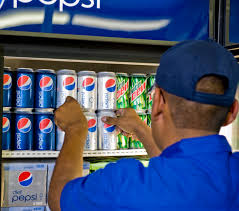The stock market took a big hit Tuesday morning, responding to comments from the White House that took away assurances that a deal between the U.S. and China might resolve trade tensions in the near future. President Trump denied any firm timeline for a Chinese trade deal, suggesting that it could wait until after next year's presidential election, and that disappointed those who had grown increasingly confident that at least a partial agreement might come soon. As of 11 a.m. EST, the Dow Jones Industrial Average (^DJI 0.36%) was down 446 points to 27,337. The S&P 500 (^GSPC 0.90%) fell 37 points to 3,077, and the Nasdaq Composite (^IXIC 1.46%) dropped 112 points to 8,456.
With earnings season largely behind us, merger and acquisition activity came to the forefront. PepsiCo (PEP +1.53%) made waves by buying a snack food specialist, but investors were less comfortable with Cleveland-Cliffs' (CLF +4.00%) move in the steel industry.
PepsiCo seeks to add to its snack lineup
Shares of PepsiCo were little changed Tuesday morning after the beverage and snack giant announced an agreement to acquire privately held BFY Brands. PepsiCo didn't provide terms for the acquisition, saying simply that it's subject to typical conditions and regulatory approvals.

Image source: PepsiCo.
The move seeks to expand the line of snacks that PepsiCo already has. BFY is the food company behind the popular PopCorners snack brand, with its bite-sized triangles of popped corn appealing to customers seeking a more wholesome food experience. The CEO of PepsiCo's North American foods unit weighed in to explain that BFY's "production capabilities will support the growth of our existing, more-nutritious snack brands."
PepsiCo was a pioneer in identifying consumer trends toward healthier fare, and it took criticism early on for moving away from more traditional snack foods. Yet the beverage giant's strategy has paid off, and the BFY purchase shows that it remains a priority for PepsiCo to appeal to health-conscious customers.
Cleveland-Cliffs steels its resolve
Shares of Cleveland-Cliffs plunged 13% after the iron ore producer said it would purchase steel manufacturer AK Steel (AKS +0.00%). The move will create a vertically integrated steel producing operation, but it raises questions about unintended consequences from the merger.
Under the deal's terms, AK Steel investors would receive 0.4 shares of Cleveland-Cliffs for every share of AK Steel they own. Based on Monday's closing prices, that works out to about $1.1 billion in value for AK Steel shareholders and puts a $3 billion enterprise value on the steelmaker.
Cleveland-Cliffs CEO Lourenco Goncalves was pleased with the deal, noting that "we are creating a premier North American company, self-sufficient in iron ore pellets and geared toward high value-added steel products." In particular, AK Steel's relationships in producing high-end steel for automakers will be a key asset.
Yet investors seem nervous about the move, especially because of the uncertainty in the global steel market right now. Tariffs have created volatility in steel stocks recently, and removal of those tariffs could create new challenges for the industry. That makes the timing of Cleveland-Cliffs' offer risky, and shareholders seem skeptical that it will prove to be a successful strategic combination.










